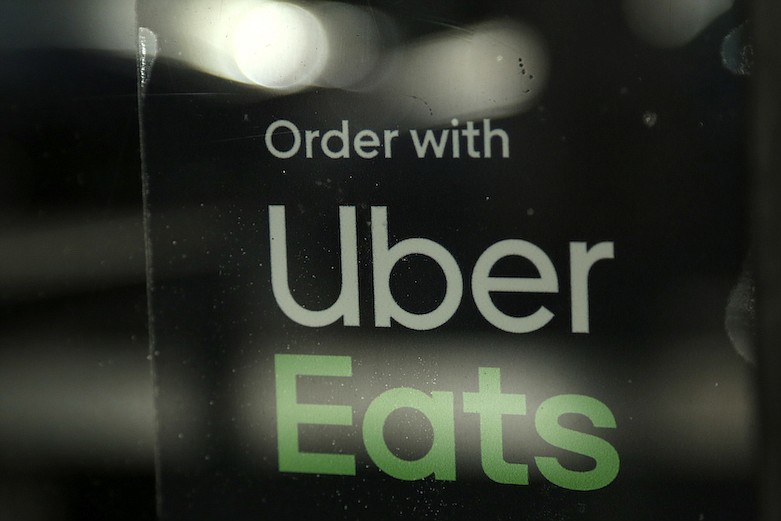Uber is considering acquiring Grubhub in a deal that would give the companies control over a majority of the U.S. food delivery business, according to published reports.
Ride-sharing and food delivery giant Uber Technologies Inc. approached Grubhub Inc. earlier this year with an all-stock takeover offer, The Wall Street Journal reported Tuesday, citing sources. The two companies are continuing to discuss the combination, and Uber's board will consider it in the coming days.
Uber and Grubhub declined to comment on the report when contacted by The Associated Press.
Combined, Uber Eats and Grubhub would control 55% of the U.S. food delivery market, according to Dan Ives, an analyst with Wedbush Securities. DoorDash, their chief competitor, controls around 35% of the market.
"Clearly this would be an aggressive move by Uber to take out a major competitor on the Uber Eats front and further consolidate its market share position, especially as the COVID-19 pandemic continues to shift more of a focus to deliveries versus ride-sharing in the near term," Ives wrote in a note to investors.
Federal deficits triple prior record
The federal government piled up a record deficit in April, traditionally a month of big budget surpluses.
The sea of red ink is being created by a drop in revenue and a massive increase in spending to fund efforts to deal with the coronavirus pandemic.
The Treasury Department said Tuesday that the government racked up a shortfall of $737.9 billion last month. That was more than three times larger than the previous record monthly deficit of $235 billion set in February.
The deficit so far for the fiscal year that began Oct. 1 climbed to $1.48 trillion.
Treasury normally runs surpluses in April as the government revenues swell because of the annual April filing deadline for tax payments. But this year, among the many measures the government has taken to try to cushion the blow of the coronavirus shutdowns, the April 15 tax deadline has been deferred to July 15.
The Congressional Budget Office has estimated that all the spending the government has done to deal with what is expected to be a sharp recession will push the deficit for the entire year to $3.7 trillion.
That would surpass the previous record $1.4 trillion set in 2009, the first of four years in which the annual deficits climbed above $1 trillion as the government battled to pull the country out of the Great Recession.
Boeing sells no planes in April
Boeing failed to sell a single commercial airplane but saw orders for 108 planes canceled in April as a sharp drop in air travel erased any demand among airlines for new jetliners.
It marked the second month this year in which Boeing received no orders, a fate that would have seemed impossible not long ago. Boeing also indicated Tuesday that it is no longer certain about completing orders for another 101 planes and dropped them from its backlog, which dropped below 5,000.
The COVID-19 outbreak has caused global air traffic to plummet and compounded a crisis at Boeing Co. that began with two fatal crashes and the grounding of its best-selling plane, the 737 Max.
Airlines have grounded 16,000 planes - nearly two-thirds of the world's fleet - and they are delaying deliveries of jets that they agreed to buy before the pandemic.
Honda quarterly loss totals $276 million
Japanese automaker Honda Motor Co. sank deeper into losses for the fiscal quarter that ended in March, as the damage to the industry from the coronavirus outbreak hurt sales and crimped production.
Tokyo-based Honda reported Tuesday a January-March loss of 29.5 billion yen ($276 million).
The maker of the Odyssey minivan and Asimo robot had reported a 13 billion yen loss for the same period in 2019, when it was hurt by various expenses and an unfavorable exchange rate.
Quarterly sales declined almost 15% to nearly 3.5 trillion yen ($32 billion).
Honda, which also makes motorcycles, did not provide forecasts for the current fiscal year because of uncertainties caused by the pandemic.
It said it will give projections as soon as possible. The last time Honda was unable to provide any annual forecast was after the March 2011 tsunami, quake and nuclear disaster that hit northeastern Japan, where Honda had production plants.
"Honda has faced serious problems before, and Honda has overcome them before. We will do it again, working as a team at Honda," President Takahiro Hachigo told reporters.
